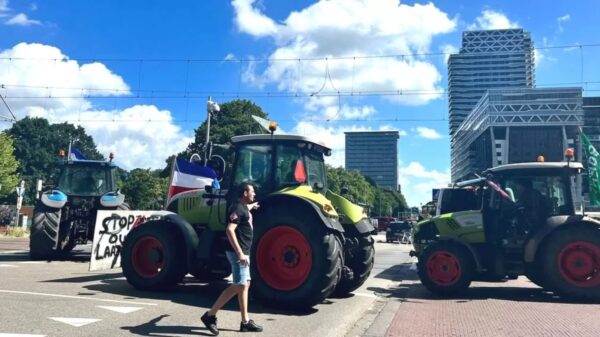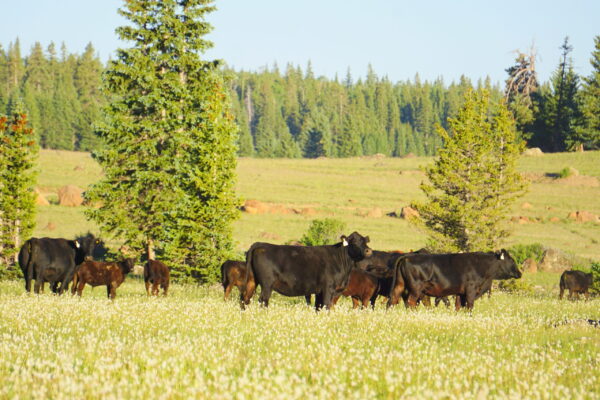In June of 2022, Dutch farmers and thousands of other protesters clogged the highways throughout the agricultural nation to speak out against the government’s proposed environmental regulations. Highways were covered with tractors and burning hay bales while some farmers flung manure on the steps of government buildings.
Those regulations sought to cut nitrogen emissions from livestock as much as 70%, with some areas required to cut nitrogen by 95%. According to government estimates, about 30% of livestock farms would have to shut down, and thousands of other operations would have to reduce livestock.
Climate activists said this was a necessary transition, even if it meant the devastation of the nation’s agricultural industry.
Western media largely ignored the story.

Meanwhile in America, the fight against livestock and especially cows, has gained traction in recent years. But unlike in The Netherlands, the fight over cows is not about nitrogen: it’s about methane.
So Gassy
For decades the fossil fuel industry has come under attack from environmentalists for emitting greenhouse gasses. Fortunately manufacturers have largely mitigated more harmful emission such as volatile organic compounds (VOCs) from automobiles. This has left carbon dioxide emissions as the main threat.
That is not the case with agriculture, however. Environmentalists still have a valid reason to be concerned: overall emissions of greenhouse gasses from livestock may be volumes smaller than the CO2 emitted by burning fossil fuels, but it’s the methane emitted from cow farts and burps that is the problem. Methane is 80 times more powerful as a greenhouse gas than carbon dioxide.
That’s a big smelly problem. But one detail activists leave out of the methane story is that while the very-stable CO2 molecule sits in the atmosphere for centuries, methane only lasts about 12 years. All-in-all, methane accounts for about 30% of the global temperature increase, according to International Energy Agency. 60% of methane comes from human sources (like agriculture), and it has more than doubled since pre-industrial times.
Across the pond, European Union nations are trying to figure out ways to meet their 2021 Glasgow Pledge which promises to reduce methane emissions by 30% by 2030. With only righteous wetlands out-emitting evil agriculture, ag has become the new target of emission limits.
Cutting cows from society has proven a difficult task, especially in America. Total beef production today is still about the same level as it was 20 years ago — totaling 28 billion pounds annually. Per capita that represents a decrease — but it’s still the same number of cows with the same amount of methane. Short of being able to cut cows by government regulation, the only other way activists could induce change is through some change in culture.
Let Them Eat Bugs
In the United States, climate activists unsatisfied with governmental regulation as a solution have taken to the helm of fighting farts through a cultural revolution. And if we can’t eat beef as a source of protein, these guys have another great alternative: bugs.
It’s hard to know how serious the eat bugs movement really is.
In March this year, NPR’s Huo Jingnan dismissed the idea as a right-wing conspiracy theory.
Except, that it was a topic of discussion in World Economic Forum two years ago as a solution to mitigate the climate crisis. Not only that, but the idea has also somehow made its way into school curricula, even in Utah.
This came to the forefront earlier this year when a Nebo School District (Springville) teacher asked her 6th-grade students to write essays on why Americans should be eating bugs instead of cows. Ironically, it was a persuasive essay but there was only one right answer.
“How come we can’t state our opinion on why Americans shouldn’t be eating bugs?” one student asked in a video that went viral.
“Because we don’t have any evidence to support it,” the teacher responded. “It’s kind of weird that I gave you a topic where there is only one right answer. We don’t want to eat bugs and it’s gross. But should we be eating bugs? Yeah, because we’re killing the world by raising cows and animals.”
Most telling, the teacher wouldn’t eat the bugs herself. Maybe someone else would if she did her part promoting it?
While the teacher’s answer was not particularly persuasive and not very specific, the idea of eating bugs has some merit. As two European professors explained, growing livestock is a very inefficient way to raise protein, with between 70% and 80% of all ag land dedicated to meat production. Raising insects as a source of protein would be much more efficient on total land used, and would free up a lot of land for…
I don’t know, rejoicing in our new diet? Picture me frolicking in an empty pasture now.
Even so, that’s not totally fair: much of what the professors are proposing is that the bugs would be fed to other livestock in a new protein-rich diet.
Mind Yer Own Burger
The bug thing certainly is viable — I mean, if anyone wants a crunchier meal. But people in developed nations probably won’t bite this bait. There is certainly hunger in the world, but there is also a lot of surplus that just doesn’t make it to the mouths that need it most. If we were short on land or other resources, bugs might be a great way to go. But we just don’t have that need yet, and I don’t think we ever will.
Also baked into the fight against cows is the fight against alfalfa. Like the two professors who argue our form of ag takes up too much land, the American environmentalist’s argument against alfalfa is that it takes up too much water (see an article on alfalfa in this issue). But do these environmentalists have a better use of the water besides running it into the Great Salt Lake, or the ocean? Show me your use, that it is more righteous than mine — but morality aside, you still have to buy the water right from me. The water right is privately owned — not public for the taking.
Cows do present a serious problem for those who believe human’s impact on the planet should be net-zero. They can try to regulate that through administrative law, such as the attempt to push cows off public land. But the demand is still there, and if Americans are still going to consume 28 billion pounds of beef each year, that beef will be raised elsewhere — in the Midwest, or even the Middle East.
The only way activists can tackle Americans’ hunger for genuine beef is to remove it from our culture. Ok, that’s fine. Show us your great lifestyle eating tofu, etc. Vegetarianism is way better than it used to be and you can eat well with it. Persuade us with this.
But no doubt activists will not take such a positive, persuasive approach. Instead, they will use shame culture as the tool to accomplish the cultural revolution they seek. That’s too bad, because shame, as a religious concept, only works on “the believers.” If you believe eating beef is good, then someone else’s religion teaching otherwise will have no effect on you. You can’t be shamed for not adhering to a standard you don’t have. And very few people are vegetarian on moral grounds. To win the rest of us, they ought to not alienate us.
Whether it’s methane or a shortage of farm real estate that bothers you most about cows, you have to admit we are pretty lucky to live during this time, here in America. Resources are plenteous and our impact is not much more than the Earth cannot accommodate for. Still we try to be more sustainable.
Sustainability is best achieved on a personal level. If you want to help the planet, it’s up to you. Drive less. Eat less meat. Turn the lights out. Pick up trash. You do it because you believe in it. But don’t be indignant when you can’t force others to do the same — whether by regulation, or by shame. There is a much better way to live!
– by AJ Martel

Feature image caption: Cows graze on summer range near a spring on Griffin Top west of Escalante, July 15, 2023.
AJ Martel – Escalante
AJ Martel is the youth coordinator at The Byway, but he is involved in most everything. He and his family live in Escalante, and they love it here! AJ has found Utah’s small towns quite inviting and under-defended, which is why he’s so involved with the paper. What AJ loves to do most, though, is serve his community. That is clear through everything he writes and does for Escalante, Utah.

